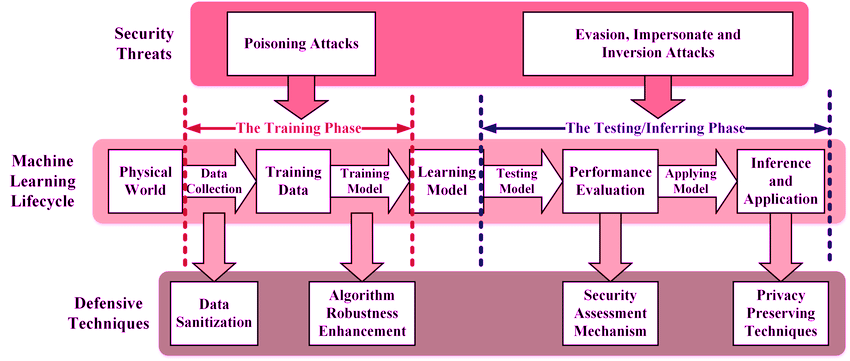Machine Learning Application in Defense/Military
Machine learning is one of the most trending technologies today. It is widely used in various industries such as healthcare, manufacturing, automation, infrastructure, banking, finance, transport, product recommendations, social media, news, defense, marketing, and many more. Among all these industries, defense is one of the most important parts of the development of any country, and machine learning also plays a significant role in modern warfare systems, such as developing autonomous weapons. Although autonomous weapons have been in existence for more than a century by combining them with machine learning, they have more functionalities now.

Machine learning technologies are used in many ways, such as image recognition, which helps identify, detect, track, and classify targets or objects using various sensors. Hence, machine learning applications are very much helpful for the defense sector. This topic will discuss various ML applications and their use cases in the military system. So, let's start with a quick introduction to machine learning and technologies used in ML.
What is Machine Learning?
Machine Learning is a branch of computer science and sub-branch of Artificial Intelligence. "Machine Learning is defined as the study of various technologies or algorithms that allow systems to automatically learn and improve from past experience."
Types of Machine Learning
Machine learning can be categorized in mainly three types as follows:
- Supervised learning
- Unsupervised learning
- Reinforcement learning
Applications of Machine Learning
Machine Learning is a broad term and can be applied in many industries. There are a few popular machine learning applications as follows:
- Speech recognition using natural language processing (NLP)
- Text recognition
- Image recognition
- Big data and business intelligence analysis
- Robotics and automation
- Traffic prediction
- Product recommendations
- Self-driving cars
- Email spam and malware filtering
- Virtual personal assistant
- Fraud detection
- Stock marketing and trading
- Healthcare and medicine
- Automatic language Translation
- Manufacturing industry, etc.
Applications of Machine Learning in Defense
Machine Learning and artificial intelligence is currently being used in various military applications. Also, most countries spend a huge amount of money researching and developing military applications. There are a few major military applications where machine learning is being applied and will prove its importance in the years to come.
- ML in Warfare Platforms
- ML in Cyber security
- ML in Logistics and Transportation
- ML in Target Recognition and tracking
- ML in Battlefield Healthcare
- ML in defense Combat Training
- ML in Threat Monitoring
- ML in Maritime situational awareness
- ML in Unmanned sensor systems: UAVs, UGVs, UUVs
- ML in Unattended sensors and systems
- ML in Compound security and force protection
- Border protection
- Route planning clearance
- Reconnaissance and surveillance
- Vehicle situation awareness
- Improved visualization
Let's discuss some important ML applications in defense systems:
-
Warfare Platforms
Machine Learning and Artificial Intelligence are being embedded into Weapons and other military systems of different countries across the globe, used on land, naval, airborne, and space platforms.
The application of AI-enabled systems on these platforms helps develop efficient warfare systems, which require less human intervention. It also helps increase synergy and enhances the performance of warfare systems while requiring less maintenance. AI and ML are expected to empower autonomous and high-speed weapons to perform collaborative attacks.
-
Defense Cyber security
The military system of any country is one of the most important parts to maintain the security of the whole nation. Hence military/defense systems are most sensitive to cyberattacks, as it can lead to loss of crucial information of military and can also damage the whole system.
However, AI and ML embedded systems can automatically protect networks, computers programs, and data from any kind of unauthorized access. Further, ML-enabled web security systems can record the pattern of cyberattacks and develop counter-attack tools to tackle them.
-
Logistics & Transportation
Machine Learning plays a crucial role in defense logistics and transportation systems. For each successful military operation, it is required to effective transportation of essential components of a military such as goods, weapons, ammunition, etc.
Embedding AI/ML with a military transportation system can reduce transportation costs and also human operational efforts.
Recently, the US Army collaborated with IBM to use its Watson artificial intelligence platform to help pre-identify maintenance problems in Stryker combat vehicles.
-
Target Recognition and Tracking
Machine learning and artificial intelligence are also involved in enhancing the accuracy of target recognition in complex combat environments. These techniques allow defense forces to gain an in-depth understanding of potential operation areas by analyzing reports, documents, news feeds, and other forms of unstructured information.
-
Battlefield Healthcare
Machine learning and Artificial intelligence help in battlefield healthcare such as evacuation activities, remote surgical systems, etc. In war zones, various robotics surgical system and robotics ground platforms are equipped with ML technologies helps in difficult medical diagnosis and handling injuries in combat situations.
-
Defense combat Training
Machine learning enables computers or machines to train the troopers with various combat systems deployed in various military operations in warzones. It provides stimulation and training with various software engineering skills that help during a difficult situation. The USA is investing so much money in simulation and training applications. Further, various countries use this ML-equipped combat training system to train their soldiers instead of the classical approach that requires more money and time as well. These modern approaches are more efficient and also be adaptive.
Reinforcement learning helps in building a combat training system where they learn by reward and punishment as feedback. This approach becomes more significant in maintaining an enhanced training system for their individuals.
-
Threat Monitoring
Threat monitoring is defined as a network monitoring solution/system, which is dedicated to analyzing, evaluating, and monitoring an organization's network and endpoints to prevent various security majors such as network intrusion, ransomware, and other malware attacks.
The typical process of ML in detecting security threats is given in below image:

Machine Learning helps in threat detection through various detection categories such as Configuration, Modeling, Indicator, and Threat Behavior. By using sophisticated ML algorithms, computer systems are being trained to detect malware, run pattern recognition, and detect the malware behaviors or ransomware attacks before it enters the system. AI also plays a vital role in developing an intelligent system for threat awareness, such as drones. These drones are equipped with intelligent software and algorithms that enable them to detect threats, analyze them, and prevent them from entering into the system. All big countries like the USA, Russia, China, France, Britain, Japan, India, etc., are investing huge amounts of money in making drones to detect threats and target especially useful in remote areas.
-
Anomaly detection
Anomaly detection is defined as an outlier's process which is used to identify suspicious events, items, and observations that deviate from a dataset's normal behavior. Anomaly detection is also significant to identify the pattern of abnormality in data and later discriminate these patterns that differ from the normal state, i.e., outliers. ML and AI help anomaly detection to find the outliers data in a series of data. Supervised machine learning plays an important role in pattern recognition in anomaly detection.
-
Surveillance applications
Reconnaissance and Surveillance system has become a crucial part of any country to collect and manage huge amount of defense data. These applications use various sensors and continuously transmit a stream of information through data networks to data centers. Data scientists analyze that data and extract useful information from it. In this entire procedure, machine learning (ML) helps data analysts to detect, analyze, organize and manage data automatically.
-
Decision-support system
A decision-support system is helpful for various industries in different applications such as medical treatment, manufacturing, marketing, self-driven equipment (drones), etc. Similarly, ML also helps to build enhanced decision-support system for the defense sector, such as intelligent drones, automatic cruise missiles, automatic weapons that takes decision in accordance with suspicious objects. ML helps machines to make a decision by analyzing data and proposing the best course of action for them.
-
Border protection
The main goal of the defense sector is to protect their country from border attacks by means of patrolling that region. Although soldiers are always positioned to look out the border but nowadays, various smart sensors and intelligent machines such as drones are playing a crucial role in the border security system. These drones are equipped with various ML algorithms and software that detect, analyze, and inform against any suspicious activity by sending information to data centers. Hence, it is more useful in dangerous situations where human intervention is not significant.
Conclusion
To this end, we can say that machine learning has become an essential part of the modern defense system in comparison to conventional systems. Machine learning and artificial intelligence enable military systems to handle a huge volume of data more efficiently and improve combat systems with enhanced computing and decision-making capabilities. AI and ML are being deployed in the entire defense industry. The Governments and tech industries are continuously investing their money and efforts to increase ML involvement in their defense sector to ensure better security of their country inside and outside the borders.
|

 For Videos Join Our Youtube Channel: Join Now
For Videos Join Our Youtube Channel: Join Now











